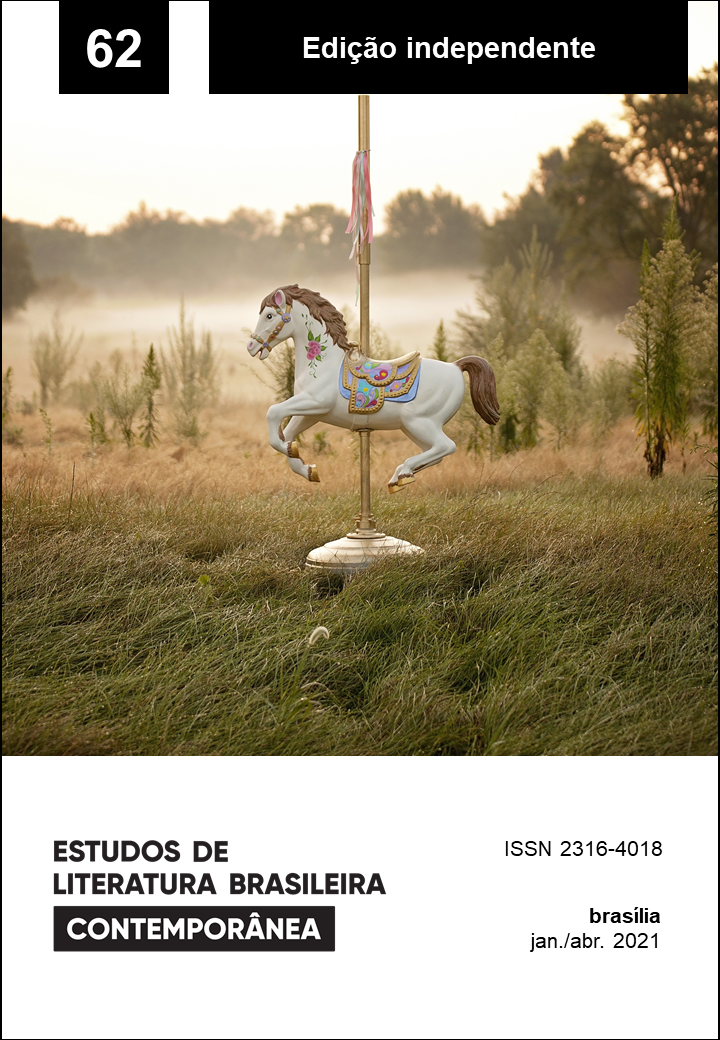Networks of Border Literatures as Existence and Plurality
DOI:
https://doi.org/10.1590/2316-4018624Keywords:
transitive americas, literary networks, frontier literature, literary portunholAbstract
The reflection proposed in this article focuses on the issue of literature networks in Portunhol and other languages, in the books Triple frontera dreams (2012) by Brazilian writer Douglas Diegues, Xirú (2010) by Paraguayan Damián Cabrera and Viralata (2015) by Uruguayan Fabián Severo. By considering how some Latin American writers share the experience of the border space, the use of Portunhol and border languages as a literary expression, the publication of their works in the first two decades of the 21st century and their independent editing, in addition to their social media presence, the analysis aims at addressing what mechanisms such authors activate in order to create their narratives as a locus of ennunciation, without configuring a discourse of immanence or transcendence, but seeking ways to articulate the singularity that are characterized by the notion of "community of existence". The border is characterized by a relationship of either liberation or domination, and it is a space practiced and marked by plurality, which manifests itself as social tension of coexistence in Damián Cabrera, as melancholy of an absent meaning converted into words and invented memories in Fabián Severo, or as enjoyment of the present via delirium in Douglas Diegues. It is a community of existence that manifests itself in the expression of these frontier writers, formed by the contact and articulation of their literary networks.
Downloads
References
ACHÚGAR, Hugo (2006). Planetas sem boca. Tradução de Lisley Nascimento. Belo Horizonte: Editora UFMG.
AGAMBEN, Giorgio (2013). A comunidade que vem. Tradução de Cláudio Oliveira. Belo Horizonte: Autêntica.
ALÓS, Anselmo Peres (2012). Portuñol selvagem: da “língua de contato” à poética da fronteira. Revista de Letras da UFF, Niterói, n. 45, p. 289-304.
BANCESCU, María Eugenia (2013). Fronteras del centro/fronteras de la periferia: sobre el portunhol selvagem de Douglas Diegues. Sures, Foz do Iguaçu, n. 1, 1-13.
BERND, Zilá (2003). Americanidade e transferências culturais. Porto Alegre: Movimento.
CABRERA, Damián (2010). Xirú. Blog. Disponível em: xirudamian.blogspot.com. Acesso em: 20 jan. 2020.
CABRERA, Damián (2014). Notas para representarse. Decires en frontera. In: PEREIRA, Diana Araújo. Cartografia imaginária da tríplice fronteira. São Paulo: Dobra Editorial. p. 167-180.
CATONIO, Angela Cristina Dias do Rego (2018). Palabras tortas: o portunhol literário de Fabián Severo e Douglas Diegues. Tese (Doutorado) – Universidade Estadual Paulista, Assis.
COTA, Débora (2017). Xirú: barro, comunidade e identidade em uma narrativa fronteiriça. RELAcult - Revista Latino-Americana de Estudos em Cultura e Sociedade, Foz do Iguaçu, v. 3, ed. especial, p. 1-8.
DELEUZE, Gilles; GUATTARI, Félix (1995). Mil platôs. Capitalismo e esquizofrenia. v. 1. Tradução de Aurélio Guerra Neto e Celia Pinto Costa. São Paulo: Editora 34.
DIEGUES, Douglas et al. (2008). Karta-Manifesto-del-Amor-Amor-en-Portunhol-Selvagem, O Globo, 17 ago. Disponível em: https://oglobo.globo.com/cultura/confira-manifesto-em-defesa-do-portunhol-selvagem-3607777. Acesso em: 23 jan. 2020.
DIEGUES, Douglas (2009). [Entrevista a] Julio Daio Borges. Digestivo Cultural, São Paulo, 1º jan. On-line. Disponível em: http://bit.ly/3ajcNJk. Acesso em: 20 jan. 2020.
DIEGUES, Douglas (2012). Triple frontera dreams. Buenos Aires: Eloísa Cartonera.
DIEGUES, Douglas (2017). Triple frontera dreams. Buenos Aires: Interzona.
GASPARINI, Pablo et al. (2012). Corregirlo sería matarlo. [Entrevista a] Douglas Diegues, poeta em “portunhol selvagem miri michi”. Abehache, ano 2, n. 2, p. 159-166.
LUDMER, Josefina (2010). Aquí América Latina. Una especulación. Buenos Aires: Eterna Cadencia.
NANCY, Jean-Luc (2016). A comunidade inoperada. Tradução de Soraya Guimarães Hoepfner. Rio de Janeiro: 7Letras.
OLIVEIRA JÚNIOR, Josué Ferreira (2018). Literatura, fronteiras e margens: poéticas fronteiriças na fronteira Brasil-Paraguai. Línguas e Letras, Cascavel, v. 19, n. 42, p. 23-39.
PERLONGHER, Néstor (2000). El portuñol en la poesía. Tsé tsé, Buenos Aires, n. 7/8, p. 254-259.
PORTILLO, Diego Emanuel Damasceno (2018). Uma poética desterritorializada em Mar Paraguayo. 2017. Dissertação (Mestrado) - Universidade Federal do Paraná, Curitiba.
RANCIÈRE, Jacques (2005). A partilha do sensível: estética e política. Tradução de Mônica Costa Netto. São Paulo: Editora 34.
SEVERO, Fabián (2012). Poesía de frontera. Qué palabra es de dónde en la geografía de la Poesía. Ponencia presentada en el Encuentro de Jóvenes Escritores de América Latina y el Caribe en la Feria Internacional del Libro. La Habana: 14 fev. Disponível em: http://fabiansevero.blogspot.com/2012/02/poesia-de-frontera-que-palabra-es-de.html. Acesso em: 3 fev. 2020.
SEVERO, Fabián (2015). Viralata. Montevideo: Rumbo Editorial.
TRIGO, Abril (1997). De la transculturación (a/en) lo transnacional. In: MORAÑA, Mabel (Ed.). Ángel Rama y los estudios latinoamericanos. Pittsburgh: IILI. p. 147-172.
Downloads
Published
How to Cite
Issue
Section
License
Copyright (c) 2021 Isabel Jasinski

This work is licensed under a Creative Commons Attribution-NoDerivatives 4.0 International License.
Authors who publish in this journal agree to the following terms:
a) The authors maintain the copyright and grant the journal the right of first publication, the work being simultaneously licensed under the Creative Commons Attribution License-Non Commercial 4.0 which allows the sharing of the work with acknowledgment of the authorship of the work and publication this journal.
b) Authors are authorized to enter into additional contracts separately, for non-exclusive distribution of the version of the work published in this journal (eg publish in institutional repository or as a book chapter), with authorship recognition and publication in this journal.
c) Authors are allowed and encouraged to publish and distribute their work online (eg in institutional repositories or on their personal page) after the editorial process, as this can generate productive changes, as well as increase the impact and citation of published work (See The Effect of Free Access).
d) The authors of the approved works authorize the magazine to, after publication, transfer its content for reproduction in content crawlers, virtual libraries and the like.
e) The authors assume that the texts submitted to the publication are of their original creation, being fully responsible for their content in the event of possible opposition by third parties.


